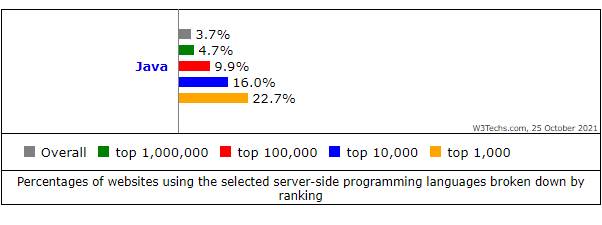
Java programming language is a versatile way to write code that can run anywhere. It was designed to be object-oriented, imperative, and robust. This has been popular among programming languages for so many years. And the trend hasn’t stopped. Well, come to the actual query: What is Java used for? This coding language serves a variety of purposes.
Developers use Java to build applications for various purposes, from mobile apps to sophisticated web development. This language is one of the most valuable skills for working in the tech field. In the job market, proficiency in Java is in great demand. IT and technology-based companies seek developers with substantial hands-on experience in Java to maintain their software applications. Interestingly, the annual income of a Java Developer has surpassed $100,000 in the US. Therefore, this skill set is excellent for building a profitable career.
What Are The Key Features of Java?
1. Platform Independence
Java’s core feature, “Write Once, Run Anywhere” (WORA), is perhaps the biggest reason behind its popularity. Java programs can be written on one platform and run on any other platform that supports Java without the need for recompilation. This platform independence comes from the Java Virtual Machine (JVM), which abstracts away the underlying system architecture.
2. Object-Oriented Programming (OOP)
Because Java is an object-oriented programming language, programmers can use it to divide complicated issues into smaller, easier-to-manage items. Java is a great option for complicated and large-scale software projects because of its property, which encourages code reuse, modularity, and scalability.
3. Strong Community and Long-Term Support
Java has been around for over two decades, and during that time, it has amassed a vast and active community. This strong community means developers have access to a wealth of libraries, tools, frameworks, and support to solve virtually any problem they might encounter.
4. Scalability and Performance
Java applications are known for their scalability, which is crucial for growing businesses. Whether it’s a small startup or a large enterprise, Java can handle increased loads without significant changes to the code. Additionally, the JVM optimizes Java code to run efficiently, offering performance close to native languages like C++.
Java’s Market Position and Popularity
Java continues to be a dominant force in the tech industry. According to w3techs.com, Java is used by 3.7% of all websites and 4.7% of the top 1,000,000 websites, solidifying its place as a go-to language for web development. Additionally, Statista highlights that 56% of developers globally use Java as one of their top programming languages, alongside Python, SQL, and HTML/CSS.

Img src: w3techs.com
What Are The Common Uses of Java in Software Development?
Java’s versatility makes it suitable for various domains of software development. Let’s explore some of the most common areas where Java excels.
1. Web Development
Java is widely used in web development, particularly for building dynamic, scalable, and secure websites. Java’s frameworks, such as Spring, Hibernate, and Struts, make web development more straightforward by offering pre-built functionalities and tools.
- Spring Framework: Spring is one of the most popular Java frameworks for web development. It provides a comprehensive infrastructure that helps developers build scalable web applications.
- Hibernate: Hibernate is used for object-relational mapping (ORM), which allows developers to handle database operations more efficiently in Java applications.
By leveraging these frameworks, developers can create everything from small websites to large enterprise web applications.
2. Mobile App Development
Java is the official language for Android app development, which powers around 70% of the world’s smartphones. The Android Software Development Kit (SDK) uses Java, making it the first choice for developers who want to build Android apps.
- Java Development Kit (JDK): The JDK provides all the tools and libraries necessary for building mobile apps. With a vast ecosystem of libraries and tools, Java makes it easier for developers to create feature-rich, high-performance mobile applications.
Whether you’re developing a basic utility app or a complex mobile game, Java’s versatility and Android support make it an excellent choice for mobile app development.
3. Enterprise Applications
Java has long been the language of choice for building enterprise-level applications. Its scalability, security, and robustness make it ideal for developing applications that need to handle massive amounts of data and traffic.
- Enterprise Resource Planning (ERP): Java is commonly used in ERP software to manage and automate the back-office functions of businesses.
- Customer Relationship Management (CRM): CRM systems, which help companies manage interactions with customers, also frequently use Java to ensure reliability and security.
Because Java can easily scale to accommodate growing data and user loads, it’s used extensively by large corporations, including financial institutions, healthcare providers, and tech giants.
4. Cloud Computing
Java is a preferred language for cloud-based applications due to its platform independence and scalability. Java-based applications can seamlessly integrate with cloud platforms such as Amazon Web Services (AWS), Google Cloud Platform, and Microsoft Azure.
- Microservices Architecture: Many cloud applications are built using microservices architecture, and Java’s frameworks (like Spring Boot) make it easy to create modular, scalable services that can run independently.
Whether it’s developing SaaS (Software as a Service), PaaS (Platform as a Service), or IaaS (Infrastructure as a Service) applications, Java remains a top choice for cloud computing.
5. Internet of Things (IoT)
The Internet of Things (IoT) is a rapidly growing field, and Java is well-suited to power IoT devices and systems. Java’s portability across platforms and ability to run on low-power devices makes it an excellent choice for developing IoT solutions.
- IoT Gateways: Java can be used to develop gateways that connect different IoT devices and manage communication between them.
- Smart Devices: Many smart devices use Java to handle processes like real-time monitoring, data collection, and device automation.
Java’s adaptability and security features are crucial in IoT applications, where devices often operate in constrained environments and handle sensitive data.
6. Big Data Technologies
With the explosion of data in recent years, Java has become a key player in the big data space. Many big data tools and frameworks are written in Java, making it a top language for developers working in this field.
- Hadoop: Apache Hadoop, one of the most widely used big data frameworks, is built on Java. It enables the distributed processing of large datasets across clusters of computers.
- Apache Spark: Spark, another popular big data tool, is also Java-based and offers faster data processing capabilities compared to Hadoop.
Java’s reliability and scalability make it a perfect fit for managing and processing large amounts of data in real time.
Java in Emerging Technologies

As technology continues to evolve, Java’s influence extends into many cutting-edge fields. While often associated with traditional applications, Java has adapted to meet the demands of emerging technologies, showcasing its versatility. Below, we’ll explore two areas where Java is playing a pivotal role: Artificial Intelligence (AI) and Blockchain Development.
1. Artificial Intelligence (AI) and Machine Learning
Although languages like Python have gained popularity in AI and machine learning due to their simplicity and robust libraries, Java is emerging as a strong contender in this space. Java’s performance, scalability, and enterprise-level features make it a viable option for AI-driven applications, especially when combined with Java-based frameworks and libraries that are continuously evolving.
Why Java for AI?
Large-scale AI and machine learning projects are best suited for Java, especially in settings where scalability and performance are crucial. Large datasets are frequently handled by AI models, and Java’s effective memory management and garbage collection assist in handling these resource-intensive activities.
Additionally, Java offers seamless integration with big data technologies like Apache Hadoop and Apache Spark, which are frequently used in data processing for AI and machine learning. This compatibility makes Java a natural fit for businesses already invested in Java ecosystems.
Key Java AI Libraries:
- Weka: Weka is a powerful open-source library for data mining and machine learning, offering tools for classification, regression, clustering, and more. It is widely used in academia and industry for rapid prototyping and research.
- DeepLearning4j (DL4J): DL4J is a commercial-grade, open-source deep learning library for Java. It supports distributed computing frameworks like Apache Spark and Hadoop, making it suitable for large-scale deep-learning projects.
- MOA (Massive Online Analysis): MOA is used for real-time machine learning with big data streams. It’s particularly useful for tasks like clustering, classification, and regression over large datasets.
2. Blockchain Development
Blockchain technology is revolutionizing industries such as finance, supply chain, healthcare, and more by offering decentralized, secure, and transparent systems. Java’s characteristics—such as its platform independence, security features, and scalability—make it an excellent language for developing blockchain-based applications.
Java’s Role in Blockchain
Blockchain development requires high levels of precision, security, and performance. Java’s long history in enterprise application development has made it a trusted choice for building blockchain frameworks and decentralized applications (dApps).
One of Java’s major contributions to blockchain technology is its role in Hyperledger Fabric, an open-source blockchain framework developed by the Linux Foundation. Hyperledger Fabric, written in Java, is widely used by businesses to develop secure, scalable blockchain solutions that support complex business transactions.
Key Java Blockchain Frameworks:
- Hyperledger Fabric: Hyperledger Fabric allows businesses to create private blockchain networks tailored to specific use cases, such as supply chain management or secure data sharing. Java’s strong support for modular and enterprise-level applications makes it ideal for building and scaling these systems.
- Web3j: Web3j is a Java library that enables developers to interact with the Ethereum blockchain, facilitating the creation of dApps. This library allows Java developers to work with smart contracts, transaction management, and more, bringing the power of Ethereum to Java environments.
Smart Contracts and Security:
Smart contracts are self-executing contracts with the terms of the agreement directly written into code. These contracts are central to many blockchain platforms like Ethereum, and Java is often used to write and execute these contracts securely. Java’s strong security features—such as robust memory management, cryptographic libraries, and secure coding practices—make it well-suited for handling the sensitive operations that smart contracts require.
Real-World Use Case: Many industries, including banking and supply chain management, are already using Java-based blockchain solutions to track assets, verify transactions, and ensure compliance. Java’s ability to handle complex transactions and integrate easily with existing enterprise systems makes it the go-to language for businesses looking to harness blockchain’s potential.
Why Developers Choose Java for Long-Term Projects
Java has been around for over 25 years, and yet it remains one of the most popular programming languages. Why is Java still the preferred choice for long-term projects?
1. Stability and Maturity: Java’s stability is a major factor in developers’ decision to use it for lengthy projects. Compared to more recent languages, Java is less vulnerable to unforeseen changes or disruptions because it is an established language with a solid track record. Because of this, it is a dependable option for mission-critical systems that require constant upkeep and updating.
2. Large Community and Resources: Java’s large developer community means there is a wealth of resources available, from tutorials and libraries to frameworks and tools. Whether you’re working on a small project or a large enterprise application, chances are there’s a Java tool or library that can help you achieve your goals.
3. Integration with Other Technologies: Java’s ability to integrate seamlessly with other technologies is another reason it’s chosen for long-term projects. Whether it’s integrating with cloud services, databases, or third-party APIs, Java provides robust support for working with a wide range of technologies.
Conclusion: Java is the Developer’s Choice for Versatile Solutions
Java has proven itself to be one of the most reliable and versatile programming languages available today. Its ability to seamlessly integrate into a variety of applications—from web development and mobile apps to cloud computing and blockchain—makes it a critical tool in a developer’s arsenal. Java’s platform independence, object-oriented structure, and robust community support have ensured its continued popularity, with no signs of slowing down.
Whether you’re an aspiring developer or a seasoned professional, mastering Java opens the door to numerous opportunities across industries such as finance, healthcare, and e-commerce. Its demand in the job market, along with high-paying opportunities, makes it an invaluable skill for building a successful and profitable career.
Ready to Master Java for Your Next Project?
If you’re eager to explore Java’s endless possibilities and improve your development skills, head over to Webtopping. Discover expert tips, tutorials, and in-depth guides to help you build scalable, high-performance applications with Java. Let Webtopping guide you through your next project!





